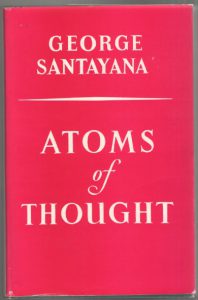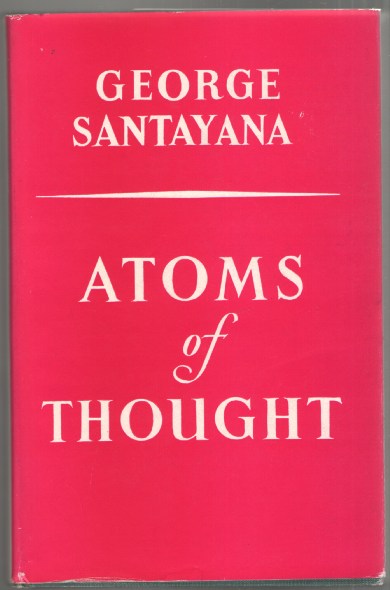 To Ira Detrich Cardiff
To Ira Detrich Cardiff
Via Santo Stefano Rotondo, 6,
Rome. May 28, 1950
After several days’ browsing [through Atoms of Thought]—I must now have read almost all the text as well as your Introduction and Foreword—I have come to the conclusion that your patience in gathering “texts” must be a sub-conscious heritage from some Puritan ancestor of yours who picked “texts” from the Bible in order to quote them against the minister’s sermons. Your interest was not at all to choose beautiful passages or passages that contained the key to my philosophy or to my idiosyncrasies. I was out of the picture, just as the real history and doctrines of the Jews and the Christians was out of the picture for your text-collecting ancestor. You both already had your complete philosophy apart from anyone else’s books: but texts might be pungent; and when they tallied with your views, they might be employed to assert them boldly under another’s masque, for greater apparent modesty. So you have collected all the anticlerical texts in my books, no matter in what context, satirical or historical or even dramatic, whether it be Zeus or Lucifer or Mephistopheles, or Hermes or Aphrodite that says them: my cynical father’s saying, or my own, if cynical in the right direction, will do for texts as well as the soft sentiments of a rich Polish-Jewish jeweller; and what I have said expressly to you and in print about myself that I am not and never wished or meant to be an American, is flatly contradicted. And when you say that I suggested the danger of spoiling a dictum if shorn too closely of its context, you forget to say or remember the danger I felt of being quoted only on the Left side; and you do not seem to feel that what you do quote about the pity that Bertrand Russell should waste his powers in repeating anticlerical commonplaces (although he did it only for pot-boilers) you do not feel that it is a pity that you should make me do the same thing in this book gratuitously. When I wrote The Life of Reason criticism of all non-naturalistic philosophy and religion was inevitable; and I did it and do it to bring out, if I can, the beauty of naturalism, not to insult the beliefs of other people. The cream of those beliefs, pagan, Indian, and Catholic especially, are just the baroque ornaments with which I like to adorn, and to vivify, my opinions; because Positivism without “post-rational” detachment is deadly and hypocritical. My anti-religious side is only a part of my pessimism; those myths are materially false, and a philosopher should not flirt with them; but they are the tragedy—Hebraic and Christian as well as Greek—of human illusions and vanity. Tragedy, the tragedy of existence, should be transcended, but it cannot be decently mocked.
I wanted to tell you frankly what I feel on this subject: but I do not regret that you should have taken the pains to make this collection. It is not a fair representation of my philosophy; but it is a fair record of one strain in it, and if it stimulates or entertains the public, so much the better. It would be unreasonable to expect the public to read us if we wrote only long books that bore them.
From The Letters of George Santayana: Book Eight, 1948–1952. Cambridge, MA: The MIT Press, 2008.
Location of manuscript: Butler Library, Columbia University, New York NY.
